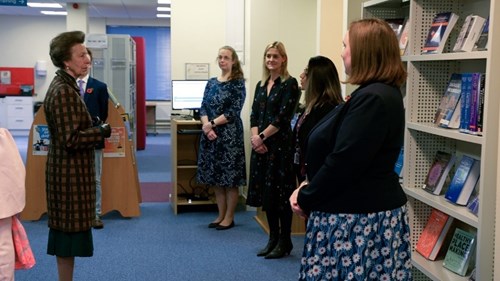Year in review: 2021

HRH The Princess Royal meeting the NCTC team in November 2021
A note from the Curator
2021 was a very busy year for NCTC, the world’s oldest bacterial strain collection. The NCTC team have continued to develop the collection but they have also had the opportunity to support the national COVID-19 response. Many of the NCTC team were redeployed to contribute to the COVID-19 diagnostic work and both NCTC laboratory space and equipment has also been repurposed to support the pandemic work. Despite this NCTC has continued to thrive and 2021 brought us a wealth of new opportunities which included a new finance management system, several scientific publications, and the addition of 47 new strains into the catalogue.
Investing in staff training and development as well as supporting early career scientists remains a very important remit of NCTC and in 2021 we were delighted to continue with this strategic objective. Out of a current team of 13 personnel, 5 NCTC staff are undertaking formal higher and further education courses including MBAs, MSc, diplomas and even a professional doctorate! In addition, in 2021 we also welcomed a sandwich student to the NCTC team who undertook a year of practical microbiological training which culminated in him undertaking a project validating characterisation of Haemophilus spp. by X and V factor requirement. This project was the foundation for applying for an extension to scope for the collection’s ISO17025 accreditation which was successfully recommend for renewal.
In September 2021 NCTC hosted the 39th Annual Meeting of the European Culture Collections’ Organisation (ECCO). The conference comprised of a series of scientific lectures, covering a wide range of topics with a focus on how Culture Collections across the world contribute to the life sciences. During the conference we had the opportunity to present several talks on the wide diversity of work we undertake within NCTC including our NCTC3000 sequencing project; our work on the identification of novel Staphlococcal enterotoxins in NCTC strains; the work of the NCTC artist in residence and our expertise in shipping high consequence pathogens. All talks form the ECCO meeting are freely available to view via the culture collections website offering a fabulous opportunity to learn about the value of European Culture Collections.
In October, NCTC’s parent organisation (formally Public Health England) transitioned into the newly formed United Kingdom Health Security Agency (UKHSA). UKHSA is responsible for protecting every member of every community from the impact of infectious diseases, chemical, biological, radiological and nuclear incidents and other health threats. NCTC is proud to play a key role in this mission by providing clinically relevant bacterial strains to underpin important scientific work. In 2021 NCTC supplied over 686 strains to 390 scientists in 52 countries which clearly illustrates both its national in and international significance.
In November the collection was delighted to host a visit from HRH The Princess Royal who attended the UKHSA Colindale site to belatedly celebrate the centenary of NCTC. HRH had a tour of the UKHSA Colindale labs and was very interested to learn about the work of NCTC over the last century and how the collection has contributed to improving public health. The highlight of the Royal visit was the opening of our newly commissioned molecular biology laboratory, the Mabel Rhodes Laboratory, named after NCTC’s first assistant curator. Mabel worked within NCTC for nearly 30 years and made a huge contribution to establishing the collection in its formative years. She published one of the first studies of viability of NCTC bacterial strains and undertook some of the earliest freeze-drying experiments. We were very pleased to both honour Mabel Rhodes’ contribution to NCTC and also host a visit from such a distinguished visitor.
The whole NCTC team is looking forward to an equally busy and productive 2022. The collection is very much a dynamic one and therefore we would like to remind all of our stakeholders that depositing is free of charge and we always welcome enquiries from potential depositors to ensure that the collection remains scientifically relevant and fit for purpose.
Written by Dr. Sarah Alexander, NCTC Curator
